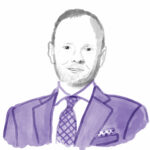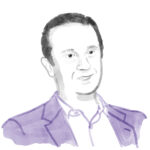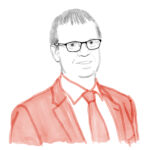While over 500 million smallholder farmers in the southern hemisphere produce more than 50% of the world’s food, less than 20% have access to traditional insurance; making them increasingly vulnerable to climate change-related weather events. We spoke with OKO and IBISA, two InsurTechs hosted by the Luxembourg House of Financial Technology (LHoFT), to learn more about their plans to enable the next generation of insurance for agriculture.
InsurTechs driving the revolution in microinsurance

Our products are available from any mobile device, even if you're not connected to the Internet, even if you don’t have a bank account.
“70% of the population in Africa works in agriculture. There is an enormous need for insurance for people who might lose all their
income when facing extreme weather,” says serial entrepreneur Simon Schwall, CEO of OKO, an InsurTech founded in 2017, using satellite data and mobile payment, to distribute affordable index-based crop insurance directly to farmers in Africa and deliver instant claim settlement when facing adverse weather.
While delivering affordable agricultural insurance for smallholders farmers is challenging with average penetration rates of 0.5%, InsurTechs are sparking a revolution within the microinsurance industry and are acting as key partners to big insurance players in building farmers’ resilience.

Simon Schwall, CEO of OKO
“Traditional insurance products are not yet able to successfully penetrate this segment due to the heavy operational costs associated with the distribution of their products, premium collections, claim verifications or payment,” adds Schwall, who entered in partnership with insurer Allianz and French telecom company Orange to scale up distribution.
“Our products are available from any mobile device, even if you’re not connected to the Internet, even if you don’t have a bank account. Customers can use their phone to obtain an insurance policy and pay their premium with only a few SMS. They don’t need to go to a point of sale.”
With a direct-to-customer distribution model allowing for rapid scale, OKO has registered 1800 customers over the last 4 months further to its first product launch in Mali. Awarded the second prize at the FinTech Awards 2019, one of the main FinTech competitions in Luxembourg, the new kid on the block has also been included in the list of the top European FinTech startups to follow in 2020 by Sifted, the Financial Times start-up media outlet.
Satellite data in action
Index-based or parametric insurance, using Earth Observation satellite data to trigger payment, is increasingly viewed as the most cost-effective way of protecting smallholder farmers against climate risks. It is a win-win situation: farmers don’t need to submit a claim and an insurer doesn’t need to send a claims adjuster.
The data provided by weather suppliers is used to define risks with high precision, optimise the premium price as well as automating the claim validation process.
“Advances in technology mean weather data is more detailed and reliable. We collect data from the last 25 years of how much rain fell so that we know in every area what is the probability of drought or flood. If we observe that they suffer from a bad season, we automatically send them a financial compensation. It is a tremendous tool for financial inclusion because it doesn’t matter how far the field of the farmer is,” stresses Schwall.
Mutual Insurers the key for Agriculture insurance
”People in rural parts of the world tend to embrace more the cooperative or the mutual model as they take decisions as a community,” explains Maria Mateo Iborra, Co-Founder of IBISA, a B2B platform, based on blockchain and satellite data, to empower local mutuals, insurers and micro-finance institutions to better protect their customers with cost-efficient insurance products.
Mutuality today accounts for 27% of the agricultural insurance market, yet InsurTechs are mostly focused on traditional insurance. This represents a big opportunity for IBISA.
“By working with our partners, we can leverage the trust they have built with their customers thus facilitating the farmer’s adoption of the product and keeping the customer acquisition costs at a marginal level.”

By working with our partners, we can leverage the trust they have built with their customers thus facilitating the farmer’s adoption of the product and keeping the customer acquisition costs at a marginal level
Incorporated in April 2019, the platform currently provides services in India, Niger, Zimbabwe and Guatemala: “In India, we currently reach 5 000 farmers and aim to on-board 35 000 customers in 2021. The idea is to keep expanding and convert as many farmers as possible as our partner in the country currently reach 2 million farmers.” In addition, the platform currently counts 10 000 breeders in Niger. The team has plans to expand in Philippines and Ethiopia.
In addition to innovative loss assessment solution, the service includes parametric risk modeling, solvency calculation, policy administration and last-mile integration. It is a turnkey solution to provide parametric insurance.
“IBISA is by nature a way to prove that insurance is inclusive, more especially for those who need it most.One of the problems of mutuals and insurers, especially in developing countries, is scalability. It becomes difficult to manage if you are not using systems that are automated. Technology is building resiliency and scalability for our partners,” adds Jean-Baptiste Pleynet, Co-founder at IBISA.
The start-up has developed strong ties within the space sector and has the support of ESA (European Space Agency) and LSA (Luxembourg Space Agency) in the framework of the Business Applications programme to further develop the platform and scale its operations in India.
IBISA leverages leading-edge technologies: satellite Earth Observation, blockchain, parametric risk modelling and a gamified collaborative platform for expert ‘watchers’ to bring insurance everywhere in an easy manner.
“Blockchain provides trust, less friction and better exchange of information. Insurance is a business based on trust more than other business because you pay first and you get the services after your pay.”

Blockchain provides trust, less friction and better exchange of information. Insurance is a business based on trust more than other business because you pay first and you get the services after your pay.

Maria Mateo Iborra, Co-Founder of IBISA
Harnessing mobile penetration
Farmers’ lack of awareness and understanding of insurance products remain a key barrier to the uptake of index insurance services. OKO is harnessing mobile penetration through its partnership with Orange Mali to conduct a voice SMS campaign educating farmers on its insurance service. Mobile money agents are also attending its community meetings to ensure customers receive help setting up their accounts and making transactions.
“We are setting up a Chatbot on WhatsApp so that people, even if they are not literate, can receive voicemails and make sure that they understand the insurance products,” says Schwall.
He stresses that rapid technological development such as GPS, speech to text recognition or image recognition will lead to building stronger resilience and opening up even bigger markets in Africa and developing countries. In this context, OKO has been selected by Google as part of its “Google for start-up” program, as one of the 11 start-ups that can have the strongest impact on sustainable development goals.
“The high resolution of phones nowadays allows for image recognition to identify a problem through machine learning. Speech-to-text recognition also helps us understand what farmers needs without necessarily having a big call centre operating all the time. Google brings us the machine learning expertise and tools to help us move forward.”

Jean-Baptiste Pleynet, Co-founder at IBISA
Start-up nation
OKO is harnessing mobile penetration through its partnership with Orange Mali to conduct a voice SMS campaign educating farmers on its insurance service. Mobile money agents are also attending its community meetings to ensure customers receive help setting up their accounts and making transactions.
“We are setting up a Chatbot on WhatsApp so that people, even if they are not literate, can receive voicemails and make sure that they understand the insurance products,” says Schwall.
He stresses that rapid technological development such as GPS, speech to text recognition or image recognition will lead to building stronger resilience and opening up even bigger markets in Africa and developing countries. In this context, OKO has been selected by Google as part of its “Google for start-up” program, as one of the 11 start-ups that can have the strongest impact on sustainable development goals.
“The high resolution of phones nowadays allows for image recognition to identify a problem through machine learning. Speech-to-text recognition also helps us understand what farmers needs without necessarily having a big call centre operating all the time. Google brings us the machine learning expertise and tools to help us move forward.”






